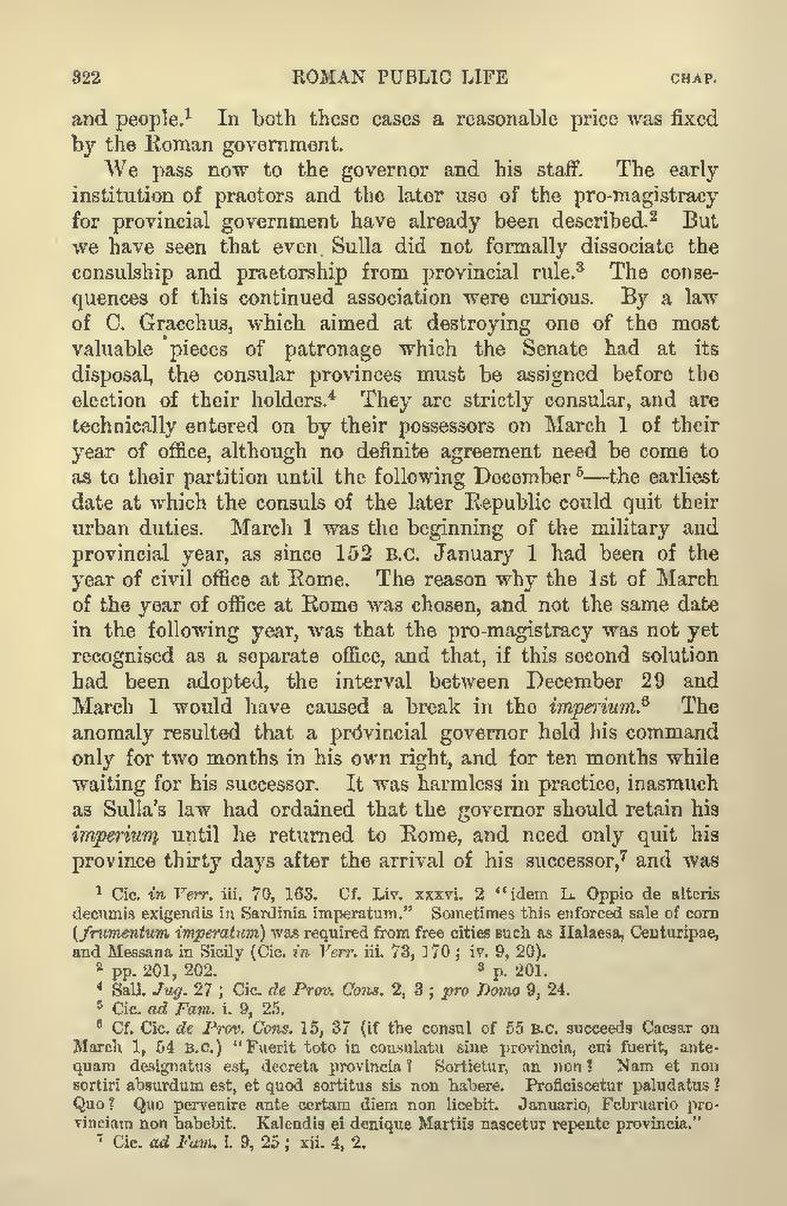and people.[1] In both these cases a reasonable price was fixed by the Roman government.
We pass now to the governor and his staff. The early institution of praetors and the later use of the pro-magistracy for provincial government have already been described.[2] But we have seen that even Sulla did not formally dissociate the consulship and praetorship from provincial rule.[3] The consequences of this continued association were curious. By a law of C. Gracchus, which aimed at destroying one of the most valuable pieces of patronage which the Senate had at its disposal, the consular provinces must be assigned before the election of their holders.[4] They are strictly consular, and are technically entered on by their possessors on March 1 of their year of office, although no definite agreement need be come to as to their partition until the following December[5]—the earliest date at which the consuls of the later Republic could quit their urban duties. March 1 was the beginning of the military and provincial year, as since 152 B.C. January 1 had been of the year of civil office at Rome. The reason why the 1st of March of the year of office at Rome was chosen, and not the same date in the following year, was that the pro-magistracy was not yet recognised as a separate office, and that, if this second solution had been adopted, the interval between December 29 and March 1 would have caused a break in the imperium.[6] The anomaly resulted that a provincial governor held his command only for two months in his own right, and for ten months while waiting for his successor. It was harmless in practice, inasmuch as Sulla's law had ordained that the governor should retain his imperium until he returned to Rome, and need only quit his province thirty days after the arrival of his successor,[7] and was
- ↑ Cic. in Verr. iii. 70, 163. Cf. Liv. xxxvi. 2 "idem L. Oppio de alteris decumis exigendis in Sardinia imperatum." Sometimes this enforced sale of corn (frumentum imperatum) was required from free cities such as Halaesa, Centuripae, and Messana in Sicily (Cic. in Verr. iii 73, 170; iv. 9, 20).
- ↑ pp. 201, 202.
- ↑ p. 201.
- ↑ Sall. Jug. 27; Cic. de Prov. Cons. 2, 3; pro Domo 9, 24.
- ↑ Cic. ad Fam. i. 9, 25.
- ↑ Cf. Cic. de Prov. Cons. 15, 87 (if the consul of 55 B.C. succeeds Caesar on March 1, 54 B.C.) "Fuerit toto in consulatu sine provincia, cui fuerit, antequam designatus est, decreta provincia? Sortietur, an non? Nam et non sortiri absurdum est, et quod sortitus sis non habere. Proficiscetur paludatus? Quo? Quo pervenire ante certam diem non licebit. Januario, Februario provinciam non habebit. Kalendis ei denique Martiis nascetur repente provincia."
- ↑ Cic. ad Fam. i. 9, 25; xii. 4, 2.
